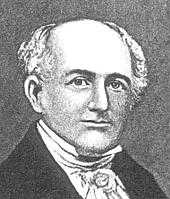Abner Kneeland
| Abner Kneeland | |
|---|---|
 | |
| Born |
April 7, 1774 Gardner, Massachusetts |
| Died |
August 27, 1844 Salubria, Iowa |
| Occupation | Preacher, Theologian |
| Spouse(s) | Four wives (First three widowed) |
| Children | 12 |
| Parent(s) | Timothy Kneeland, Martha Stone Kneeland |
Abner Kneeland (April 7, 1774 – August 27, 1844) was an American evangelist and theologian who advocated many views, religious and social, which were considered extremely radical for his day. Due to his very public stance on these issues, Kneeland became the last man jailed in the United States for blasphemy.
Biography
Early life and ministry
Kneeland was born in Gardner, Massachusetts. At the age of 21, he attended a Baptist church and served as a lay preacher for a time. However, he soon converted to Universalism where he was ordained a minister. He served as minister of various churches for a time, helping organize hymnals and making his own translation of the New Testament. He also debated with other public theologians of the day. As time went on, he became more and more skeptical of revealed religion, causing schisms in the churches he administered. Eventually, he and the Universalist Church parted ways after his views became too far removed from Christianity. Kneeland became a freethinker and pantheist, saying that the Universalist's Christian God was "nothing more than a chimera of their own imagination."

Publishing
He edited a Universalist magazine in Philadelphia 1821-1823; he managed and edited the Olive Branch and Christian Enquirer in New York City in 1828; and he founded The Investigator, an organ of free thought, in Boston in 1832.
Prosecution for blasphemy
Under the colonial charter of Massachusetts, blasphemy was still a crime, albeit one punished extremely rarely. However, perhaps because his other views inflamed the judiciary, Kneeland was charged with having violated the law. The final trial was held in 1838, five years after he had published the statements that caused the upset in the first place. Kneeland was convicted and served sixty days in prison. He was described by the judge as "a cantankerous and inflexible heretic."
Emigration and death
Kneeland left Massachusetts after the trial and moved to Iowa, where he started a small utopian community named Salubria (near present day Farmington, Iowa). Salubria failed shortly after his death in 1844.
Religious and social views
In matters of religion, Kneeland became more and more disenchanted of religion handed down from some prophet and enshrined by tradition. He disdained societal mores, preferring naturalistic and personal quests for truth.
Kneeland believed in equal treatment for all people, both under the law as well as by society. Kneeland applied this even when religious scripture would seem to indicate different roles. This included support of such controversial ideas as divorce rights for women, married woman keeping their own names and property, and refusal to condemn miscegenation (now known as interracial marriage). Kneeland was also in favor of birth control. He allowed fiery abolitionist William Lloyd Garrison the use of his lecture hall when the churches in Boston had turned him away.
Works
- A Columbian Miscellany (Keene, New Hampshire, 1804)
- The Deist (New York, 1822)
- The New Testament in Greek and English (Philadelphia, 1822)
- Lectures on the Doctrine of Universal Salvation (1824)
- Lectures on Universal Benevolence (1824)
- A Review of the Evidences of Christianity (New York, 1829)
- An Introduction to the Defence of Abner Kneeland, Charged with Blasphemy (Boston, 1834)
Notes
References
- Abner Kneeland biography from the Unitarian Universalist Historical Society
- Abner Kneeland biography from American Atheists, who see him as more an atheist than a pantheist
- Kneeland biography from the Annals of Iowa, focusing on his time in Salubria
-
 Rines, George Edwin, ed. (1920). "Kneeland, Abner". Encyclopedia Americana.
Rines, George Edwin, ed. (1920). "Kneeland, Abner". Encyclopedia Americana. -
 Wilson, James Grant; Fiske, John, eds. (1892). "Kneeland, Abner". Appletons' Cyclopædia of American Biography. New York: D. Appleton.
Wilson, James Grant; Fiske, John, eds. (1892). "Kneeland, Abner". Appletons' Cyclopædia of American Biography. New York: D. Appleton.
External links
- Works by Abner Kneeland at Project Gutenberg
- Works by or about Abner Kneeland at Internet Archive
- Works by Abner Kneeland at LibriVox (public domain audiobooks)

|